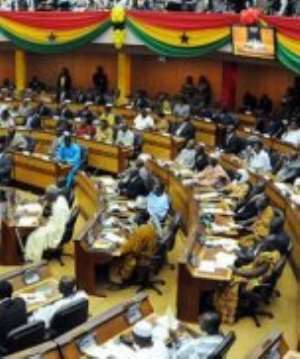
An association of Young Accountants say the budget targets are uneasy to attain based on the current macroeconomic instability which the government has no solutions.
The association argues that the premise or basis for the written statement is not on the current macroeconomic instability and correct projections for the country. But rather, on the hopeful and dreaming conditions by assuming that the economy is in good shape.
According to the association, a critical look at the current pressures on the economy means the targets are unrealistic and unattainable.
The association of Young Accountants added that the critical issues which are electricity crisis, cedi depreciation and public debt rise should be given great priority by investing hugely to reduce the unemployment canker in the country.
According to the 2016 Ghana Budget, the government is projecting the budget deficit to decline to 5.3 percent of GDP, Gross Domestic Product of 5.2 percent (non-oil) and 5.4 percent (including oil), employment for graduates and an end year inflation target of 10.1%.
The association indicated that the critical and current socio-economic indicators that make the 2016 macroeconomic targets unrealistic and unattainable are far challenging.
Electricity Crisis
The association of Young Accountants says, Ghana’s economy has moved from agriculture towards services provision (50 percent of GDP output) in the past two decades. This sector is heavily reliant on reliable electricity supply to support growth and service delivery.
The on-going rampant poor electricity supply is the main barrier to the achievement of the 2016 macroeconomic targets and hindrance to many multinational investors. This increases unemployment and investors have greatly lose confidence in setting up businesses in the country.
Cedi Depreciation
The association added that the cedi looks to depreciate further by 18%-20% next year after several reforms have proven futile.
This truly affected a lot of business as it brought an increased in their cost of production.
Public Debt
They also expressed worry over Ghana's soaring domestic and external debts which has raised hardships on its citizens.
The total public sector debt stock rose to 76.1 billion cedi in 2014 up from 51.9 billion cedi. The rise represents 67.1 per cent of GDP compared to 55.3 per cent in the previous year, Ghana's central bank announced.
External debt increased by over 50% reflecting the increased resort by the government for external commercial financing because of Ghana’s new middle income status.




 Akufo-Addo spotted ordering chiefs to stand for his handshake
Akufo-Addo spotted ordering chiefs to stand for his handshake
 Akufo-Addo ‘disrespects’ every chief in Ghana except Okyenhene — NDC Communicato...
Akufo-Addo ‘disrespects’ every chief in Ghana except Okyenhene — NDC Communicato...
 Supreme Court clears way for dual citizens to hold key public positions
Supreme Court clears way for dual citizens to hold key public positions
 Be transparent, don’t suppress the truth – Prof. Opoku-Agyemang to Jean Mensa
Be transparent, don’t suppress the truth – Prof. Opoku-Agyemang to Jean Mensa
 ‘I won’t tell the world I was only a driver’s mate during challenges’ – Prof Jan...
‘I won’t tell the world I was only a driver’s mate during challenges’ – Prof Jan...
 We’ll prosecute corrupt officials of Akufo-Addo’s govt – Prof Jane Naana
We’ll prosecute corrupt officials of Akufo-Addo’s govt – Prof Jane Naana
 [Full text] Acceptance speech by Prof Jane Naana Opoku-Agyemang as 2024 NDC Runn...
[Full text] Acceptance speech by Prof Jane Naana Opoku-Agyemang as 2024 NDC Runn...
 Election 2024: Don’t be complacent, we haven’t won yet – Asiedu Nketia cautions ...
Election 2024: Don’t be complacent, we haven’t won yet – Asiedu Nketia cautions ...
 Election 2024: Stop fighting over positions in Mahama’s next govt – Asiedu Nketi...
Election 2024: Stop fighting over positions in Mahama’s next govt – Asiedu Nketi...
 Prof Jane Naana Opoku-Agyemang will restore dignity of vice presidency – Fifi Kw...
Prof Jane Naana Opoku-Agyemang will restore dignity of vice presidency – Fifi Kw...
